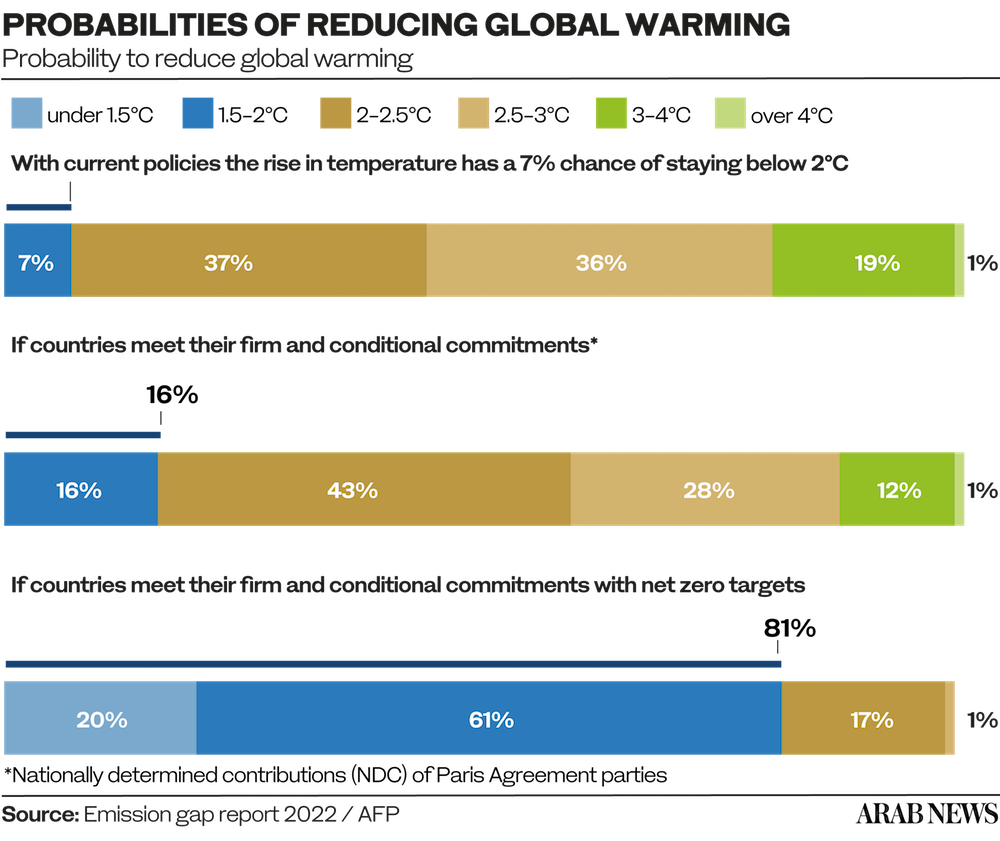CAIRO: To create a greener and more sustainable environment for future generations, Saudi Arabia is protecting up to 30 percent of its land and sea while saving endangered species through its $186 billion initiative.
Under the supervision of Crown Prince Mohammed bin Salman, the Kingdom launched the Saudi Green Initiative in 2021, which is set to address climate challenges and achieve net-zero emissions by 2060.
“The Saudi Green Initiative will provide huge investment opportunities for the private sector, quality job opportunities for the next generation of leaders in the Kingdom and enhanced international relationships that will have a positive impact on the region and the world,” the crown prince said in a statement.
The initiative comprises over 60 climate-related strategies and has designated large areas of land and sea for protection to achieve 20 percent of natural reserves by 2030 and an additional 10 percent to be delivered later.
“Working in partnership with internationally leading biodiversity protection organizations such as the International Union for Conservation of Nature, this ambitious target will ensure abundant wildlife and pristine landscapes in the Kingdom,” SGI’s official website stated.
The Kingdom currently has around 17 percent of its land and sea under protection, with Royal Natural Reserves, Natural Reserves and AlUla Natural Reserves amounting to 15 designated areas and several accomplishments in the restoration of wildlife.
Nurturing nature
Known for its natural beauty and rare monuments, the King Salman bin Abdulaziz Royal Natural Reserve, also known as KSRNR, is one of the largest protected areas in the Kingdom, covering 130,000 sq. km. In addition, the Royal Commission of AlUla, also known as RCU, has also initiated the preservation of the Sharaan Nature Reserve to restore and reinforce threatened species of great value.
Launched in February 2022, the Sharaan Nature Reserve creates eco-touristic opportunities that enrich the ecosystem by providing resorts and reintroducing wild species.
“Apart from the protected initial release site, the Nature Reserve will be, for the time being, open to the public, who will be encouraged to keep to defined paths if traveling by car and to not litter. Eventually, certain protected areas may be closed to the public to encourage habitat restoration,” RCU’s official website stated.

The SGI will be held from Nov. 11-12 in Sharm El Sheikh, Egypt, in tandem with the UN climate change Conference, also known as COP27. (Supplied)
In alignment with the SGI, the Sharaan Nature Reserve will restore 100 hectares of land that will be used to test approaches for ecological rehabilitation by 2030.
The initiative also plans to redevelop one of the Kingdom’s largest volcanic fields Harrat Khaybar to become a wildlife sanctuary, a nature-based tourist attraction and a nominated UNESCO site.
Massive efforts have already been made to impact the Kingdom’s wildlife, with $25 million dedicated to preserving the Arabian leopard and 471 rewilded oryxes and ibexes.
In June 2022, KSRNR witnessed the birth of the first wild Arabian oryx in the last 90 years. The return of the oryx promotes its natural breeding, representing an environmental achievement that contributes to the balance of the environment, enrichment of biodiversity and preservation of this species.
Currently, KSRNR has 282 species of animals, covering a wide range of mammals, reptiles, birds and amphibians.
The Kingdom has also designated 82,700 square kilometers of land to protect wildlife and implement robust rewilding programs.
The areas cover a variety of geographies, including deserts, forests, mountains and coastal spots. In addition, the Kingdom aims to designate 10 biodiversity hot spots by 2025 to preserve 500 species of plants and animals, including 55 species endemic to the Arabian Peninsula across 977 square kilometers.
The Kingdom is among the few Arab countries to be part of the Global Ocean Alliance, which is set to safeguard at least 30 percent of the world’s oceans by 2030.
In addition to its land goals, it is set to launch its reef revival initiative by 2024, plant 100 million mangroves by 2030 and launch its turtle nesting conservation site by 2025.

Giving the green light
The SGI has set out a five-step action plan to ensure these areas’ sustainability and choice of development.
An ongoing monitoring and evaluation program would track and assess the protected areas’ effectiveness and impact and categorize terrestrial and marine life to support critical ecosystems.
Thirdly, the initiative aims to consult with field experts as a collaborative environment is necessary to guarantee the development and implementation of the master plans.
Moreover, on-ground and high-tech solutions are also part of the plan to facilitate visits and photographs, with the fifth step being job creation and training for appropriate management.
The initiative plans to plant 450 million trees and rehabilitate 8 million hectares of degraded land by 2030, reducing 200 million tons of carbon emission.
The Kingdom will also contribute to cutting global methane emissions by up to 30 percent by 2030 as part of its commitment to a greener future.
A transformation of Riyadh to become one of the world’s most sustainable cities is also underway, with comprehensive solutions outlined in the SGI Forum.
The SGI will be held from Nov. 11-12 in Sharm El Sheikh, Egypt, in tandem with the UN climate change Conference, also known as COP27.
The Crown prince also launched the Middle East Green Initiative, which is aligned with Saudi Arabia’s commitment to creating a global impact.

















